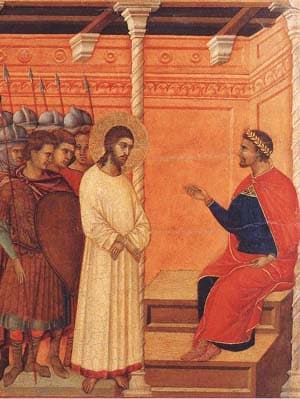Meet Leucius Charinus the First (Heretical) Christian Novelist
In the 800s, the Patriarch Photius of Constantinople (no friend of the Pope in Rome, mind you) condemned a collection of early historical-fictional Christian novels that circled around under the collected title of The Circuits of the Apostles or known today as the Leucian Romances. It included five little novelettes about the Apostles.
These “Leucian Acts” are as follows:
- The Acts of John
- The Acts of Peter
- The Acts of Paul
- The Acts of Andrew
- The Acts of Thomas
These five works were immensely popular and always carried the flavor of heresy and wild supernatural fantasy. The book about Saint John and Saint Thomas have obvious evidence of Gnostic teaching and their Christology is Docetic. These books also follow the heresy of Encratism by teaching that sexual relations between a Christian husband and Christian wife are sinful and should be avoided. In the Acts of Andrew, it tells of a Christian woman who avoids having intercourse with her husband by “piously” substituting her maid in her place without her husband’s knowledge! We also have one woman receive “martyrdom” rather than have relations with her husband.
So, yes, these are not orthodox novels for popular Catholic consumption!
- Tertullian doesn’t give the author’s name, but calls the author of the Acts of Paul a “presbyter in Asia” who was condemned by the Church (Tertullian, De baptismo 17, 5).
- Augustine identifies the author as “Leucius” and a “cobbler of fables” (Contra Faustum 22:79).
- Writing of the five Leucian Acts, Pope Saint Leo the Great said these books: “should be utterly swept away and burned.”
- The Seventh Ecumenical Council (Nicea II) said of it: “Let no one read it; and not only so, but we judge it is worthy of being committed to the flames.”
Yet despite the repeated condemnations, these books continued to be copied, circulated, and read. Many Catholic traditions such as Saint Thomas going to India, Saint John being boiled in oil in Rome, and Saint Peter engaging in spiritual battle with the heretic Simon Magus are found in the Leucian Acts.
The ancient sources hold they were written by a certain Leucius Charinus. This author’s name is interesting because it may have an esoteric connection with another ancient Christian pseudo-history.
I’m an author and I do hide esoteric things in my writings. This is part of the fun of being an author and it’s always great when readers “get it.” Sometimes it’s a footnote. Sometimes it’s an intended pun. Sometimes it’s the name of a friend or family member that’s hidden in the text.
 I recently noticed that the apocryphal Act of Pilate (sometimes called the Gospel of Nicodemus) refers to two men who were raised from the dead on Good Friday (as described in Matthew 27:53). The names of these two men are Leucius and Charinus!!! Is this an esoteric reference to the author? If so there is some connection between the five Leucian Acts and the Acts of Pilate. My guess is that it’s the same author Leucius Charinus and he’s having fun with it.
I recently noticed that the apocryphal Act of Pilate (sometimes called the Gospel of Nicodemus) refers to two men who were raised from the dead on Good Friday (as described in Matthew 27:53). The names of these two men are Leucius and Charinus!!! Is this an esoteric reference to the author? If so there is some connection between the five Leucian Acts and the Acts of Pilate. My guess is that it’s the same author Leucius Charinus and he’s having fun with it.
In the Acts of Pilate, two men named Leucius and Charinus are raised from the dead after the crucifixion, as I just related. These two men then report to the Jewish Sanhedrin about how explain how the “Good Thief” (named here as Dismas) went along with Christ through death into the limbo of Hell and the delivered of the righteous Old Testament saints. It’s a fun read, but not to be taken too seriously. The names jump out. It would be like a popular theological novel out there on amazon with the two main characters named “Taylor” and “Marshall.” Something’s afoot here.
With this evidence, it is reasonable to group it with the other five Leucian Acts of the Apostles. This would make the complete collection as consisting of:
- The Acts of John
- The Acts of Peter
- The Acts of Paul
- The Acts of Andrew
- The Acts of Thomas
- The Acts of Pilate (with two narrating characters strangely named Leucius and Charinus)
Conclusion on Leucius
My conclusion is that Leucius was a second century presbyter in Asia who was confused by early Gnostic tendencies (Docetism) and held to a strict teaching against human sexuality (Encratism). It’s easy to see how his Docetism (as a denial of Christ’s historical incarnation with a physical human body) is related to his Encratism (with an antagonism toward human sexuality and the human conception of new human bodies). More than all this, he was a gifted writer who spun out heretical works that captured the attention of both orthodox Christians and heretics.
Should you read them? Only if you recognize them as heretical and non-historical.
[reminder]
What to Watch Next
SHOP THE TAYLOR MARSHALL STORE
Dive Deeper

GET CONFIDENT IN YOUR FAITH
Explore the fascinating world of Catholic teachings with Dr. Marshall. Together you’ll unpack the brilliant answers the Church gives to tough questions about the Faith. The best part: you go at your own pace. Start this exciting journey today.


 >
>


